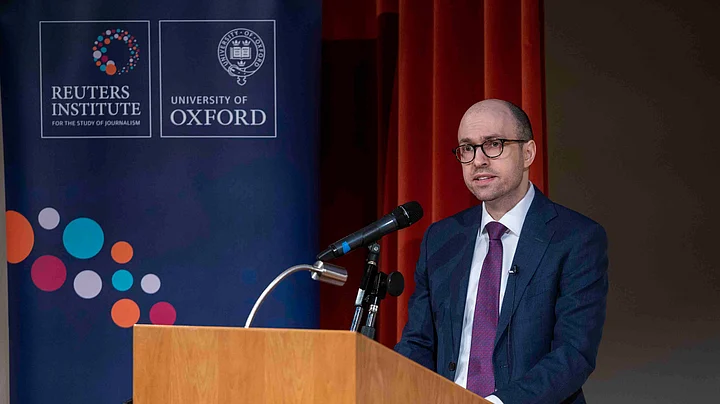"In my country, about a third of all newsroom jobs have disappeared in the last 15 years, and local newspapers continue to close at a rate of more than two a week," said AG Sulzberger, the New York Times publisher, at 2024 Reuters Memorial Lecture.
Sulzberger, who is also the chairman of The New York Times Company, was delivering the lecture titled – 'Journalistic independence in a time of division' – at the University of Oxford in England.
During his address, he deliberated on the state of journalism across the world and how difficult it has become for news organisations and journalist to sustain while providing quality work.
"In the relatively short time since I was asked to speak today, the bad news about the news industry has somehow gotten even worse. It’s not a good sign when two different magazines both use the phrase 'Extinction-Level Event' in headlines about the outlook for news organisations."AG Sulzberger
"In my country, about a third of all newsroom jobs have disappeared in the last 15 years, and local newspapers continue to close at a rate of more than two a week. The journalists lucky enough to still have jobs often lack the support needed to do original reporting of consequence – not just money but time, the guidance of experienced editors, and the ability to go to the places and talk to the people they’re writing about," he added.
He further went on to mention the hardships faced by journalist like increasing cases of threats, harassment and attacks on journalists, and record number of journalists being killed across the globe. Moreover, the anti-press rhetoric that calls journalism “fake news” and the people who report it “enemies of the people," he added.
While countering all of these aspects, he said, the news organisations also have to compete in spaces which are controlled by " handful of tech giants and polluted with misinformation, conspiracy theories, propaganda, and clickbait — all of which are further eroding trust in media."
"The Reuters Institute tells us that Americans’ trust in media, once robust, now regularly ranks among the lowest in the world, well behind countries where the media is controlled by repressive governments. Britain fares only slightly better," Sulzberger stated.
He went on state that the situation is getting worse with the arrival of Artificial Intelligence "unless those developing this powerful technology – and the frameworks to regulate it – ensure AI is used to support a trustworthy news ecosystem, rather than to hasten its demise."
Why Is Journalistic Independence More Important Than Ever?
In his speech, Sulzberger said, "this era has made journalistic independence harder than ever, rarer than ever and, I believe, more important than ever."
"Overcoming misinformation and polarisation and bringing communities together to understand the options, make hard decisions, and take action requires trustworthy facts and mutual understanding And facts and understanding are precisely what independent journalism offers society," he added.
"Yet in my role as publisher of the New York Times, I continue to be startled by the growing resistance to independent journalism," he said.
He further cited an instance where a group of people were protesting out the Times' office in New York for its "supposed anti-Palestinian bias." "They stood directly below a billboard denouncing our supposed anti-Israel bias," Sulzberger stated.
He also cited challenges they face while covering issues such as the war in Ukraine, debates over trans rights, and the conflict in the Middle East.
But What's Exactly Journalistic Independence?
While defining journalistic independence, Sulzberger said, "You can think of it as a first-order commitment to open-mindedness. Journalistic independence demands a willingness to follow the facts, even when they lead you away from what you assumed would be true. A willingness to engage at once empathetically and sceptically with a wide variety of people and perspectives. An insistence on reflecting the world as it is, not as you wish it to be. A posture of curiosity rather than conviction, of humility rather than righteousness."
"Like every news organisation, the Times gets things wrong – sometimes very wrong. Our past failures on important stories like the Iraq war or the AIDS crisis give us plenty of reasons for humility. Pursuing the truth wherever it leads sometimes means recognising our own mistakes, and correcting them fully and transparently. That, too, is independence," he added.
Difficulties While Covering Sensitive Issues
Very recently, the Times has been criticised for its coverage of Israel's war on Gaza.
While elaborating on it, said, "my colleagues have painstakingly detailed the October 7 terrorist attacks, showing how Hamas fighters invaded Israel, how they killed, sexually assaulted, and abducted more than a thousand people, and how they retreated to a tunnel system designed to protect fighters at the cost of civilians."
"Using everything from on the ground reporting to social video posts to satellite images we’ve documented the scale of Israel’s destruction of Gaza and the massive death toll of civilians, particularly children. We exposed Israel’s widespread use of 2,000-pound bombs that defy precision, the deliberate demolition of schools, mosques and homes, and the struggle for basic necessities like food, water, shelter and medical care," he added.
While citing these examples, he said, that people on each side of the conflict will find stories they like and dislike in that list.
"But independent reporting – the kind that doesn’t fully align with any one perspective – will never win over the partisans."AG Sulzberger
"Simply put, journalists don’t serve the public by trying to predict history’s judgments, or to steer society to them. Our job as journalists is firmly rooted in the present: to arm society with the information and context it needs to thoughtfully grapple with issues of the day. The belief that an informed public makes better decisions is perhaps the most hopeful conceit of an independent press," he added.
